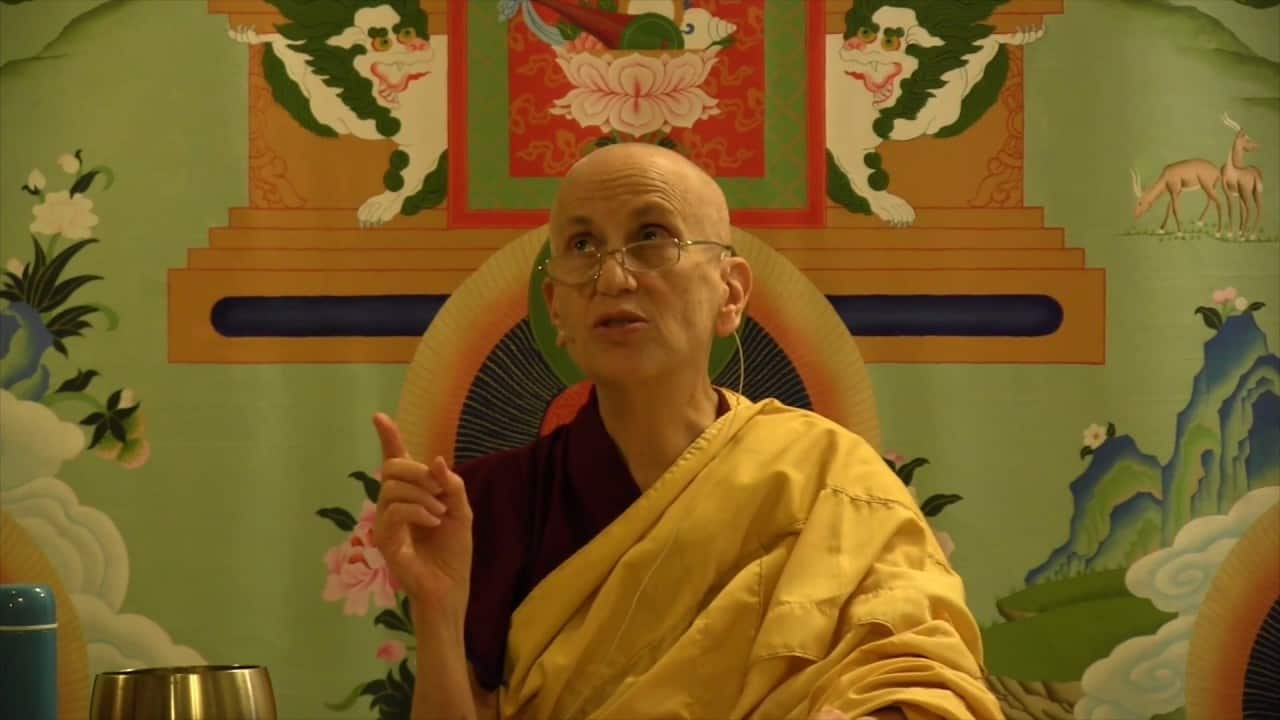Self centeredness and the five decisions
The text now turns to relying on the method for happiness in future lives. Part of a series of teachings on the Gomchen Lamrim by Gomchen Ngawang Drakpa. Visit Gomchen Lamrim Study Guide for a full list of contemplation points for the series.
- The meaning behind, benefits of, and reasons it is possible to actualize exchanging self and others
- The five decisions to cultivate before meditating on equalizing and exchanging self and others
- Recognize that there is no basis for discriminating amongst beings, nor between self and others
- See our self-preoccupation as the real enemy
- See that cherishing others is the source of all happiness
- Exchange self and other
- Devote ourselves one-pointedly to the practice of equalizing and exchanging self and others
- How the self-centered thought acts as an obstacle to benefitting others
Gomchen Lamrim 74: Self centeredness and the five decisions (download)
Contemplation points
We’re progressing through a series of meditations to lead us into cultivating bodhicitta. They are designed to be done in order: First, we meditate on equanimity, next on the Five Decisions, and then finally, the actual meditation on Equalizing and Exchanging Self and Other. Following is the meditation on the Five Decisions from this week’s teaching. Most important is to really take time with each point and to remember that it will be difficult at first. We have to reflect on these again and again until it changes us, until we really believe what these verses tell us.
- Not only is there no reason to discriminate amongst sentient beings (established from the preceding equanimity meditation), there is also no reason to differentiate between myself and others. And from the Guru Puja: “There is no difference between myself and others. None of us wishes even the slightest suffering, nor is ever content with the happiness we have. Realizing this, I seek your inspiration to enhance the bliss and joy of others.”
- Begin by looking at people you like, people you get along with. Consider this first point, that not only is there no reason to discriminate amongst friend, enemy, and stranger, there is also no reason to differentiate between myself and others. Recognize that they too, just like you, are never satisfied with the happiness they have and don’t wish even the slightest suffering…
- Next, consider this point with strangers, using the same reasoning.
- Finally, consider this point with people you don’t get along with, using the same reasoning. Consider that this meditation is particularly potent with people we’re having trouble with. Allow this point to open your mind to the fact that your “enemy” is the same in not wanting the slightest suffering; that they are the same in not being content with the happiness they have, just like you… And yet in not getting along, you continue to create the very suffering that you are both trying to avoid…
- Consider that enhancing “the bliss and joy of others” also leads to our own happiness. Spend some time thinking about how and why that is true.
- Decision #1: Having contemplated the previous points, decide… “Whatever beings do, however they talk about me, whatever they say to me, whatever they do to harm me… I will not retaliate, and I will work to enhance the bliss and joy of others.” Spend some time with this, really make this decision in your heart.
- To see our self-preoccupation as the real enemy. From the Guru Puja, “This chronic disease of self-centeredness is the cause for all our unwanted suffering. Seeing this, I seek your inspiration to blame, begrudge, and destroy the monstrous demon of selfishness.”
- We usually think others are the source of our suffering, that they are our enemy. But others are simply the external conditions for what we experience and not the cause. It is our own karma and afflictions that result in suffering. And our karma and afflictions are due to our self-centeredness. Take some time to think through this, how our own actions lead to the suffering we experience.
- Consider the wording used by the Guru Puja: “this chronic disease of self-centeredness” and “monstrous demon of selfishness.” What is it about self-centeredness that makes it like a “chronic disease?” Like a “monstrous demon?”
- Consider that no other living being can send us to the hell realms. The most they can do is end our current life. It is our OWN actions that result in a hellish rebirth.
- Decision #2: What really harms us is the self-centered attitude. Resolve to be vigilant in watching out for this “monstrous demon” of selfishness in your mind and to “blame, begrudge, and destroy” it through applying the appropriate antidotes. Spend some time with this, really make this decision in your heart.
- To see that cherishing others is rich in qualities and brings all happiness. From the Guru Puja: “The attitude that cherishes all mother sentient beings, and would secure them in bliss, is the source from which arises boundless virtuous qualities. Seeing this, I seek your inspiration to cherish these beings more than my life, even should they all rise up as my enemies.”
- Consider that the mind that wants to secure others in bliss is the source of our happiness and all the good qualities you develop. How and why is that the case? Think of some good qualities that you want to develop. Do you see how these qualities require cherishing others?
- Consider why the self-centered thought is the source of all your bad qualities.Think of some bad qualities that you want to abandon. Do you see how these qualities depend on the self-centered thought?
- Consider that if we spend time thinking of others’ good qualities, we see them in an entirely different light than if we’re focusing on their negative qualities. When we’re focused on negative qualities, they can’t do anything right. This is OUR self-centeredness and not the reality of who the person is!
- Consider that if we want to become Buddhas, the very qualities we need to develop require people to push our buttons. (in other words, how do you develop qualities like fortitude if no one is challenging you?)
- Decision #3: I want to cultivate the mind that cherishes others even more than my own life, developing my good qualities to benefit them. Spend some time with this, really make this decision in your heart.
- Having thought about all the faults of self-centeredness and the qualities of cherishing others, we decide to exchange ourselves and others. From the Guru Puja: “In brief, infantile beings labor only for their own ends, while Buddhas work solely for the welfare of others. Discerning the disadvantages of the one, and the advantages of the other, I seek your inspiration to be able to equalize and exchange self and other.”
- Consider “infantile beings labor only for their own ends.” He’s talking about us. Why is it childish to work only for your own end, in light of all you’ve meditated on so far?
- Consider that the Buddhas work only for the good of others. We think that if we completely dedicate our lives to benefitting others that we’ll suffer and yet we can see Buddhas are happy beings. Notice any resistance that comes up in your own mind and consider it in light of this point.
- Consider that the welfare of others is just as important as my own, and in light of the fact that there are more of others than of me, democratically, they become more important.
- Decision #4: Make the firm decision to exchange yourself for others. Spend some time with this, really make this decision in your heart.
- When we’ve meditated over and over again on the disadvantages of self-preoccupation and the advantages of cherishing others, we make a strong decision that we must devote ourselves one-pointedly to the practice of equalizing and exchanging self and others, and see it as the most important practice. From the Guru Puja: “Cherishing ourselves is the door to all torment, while cherishing our mothers is the foundation of all that is good. Inspire me to make my core practice the yoga of exchanging self and others.”
- Consider that to really do this exchange, it has to include a deep understanding of the faults of cherishing the self and the benefits of cherishing others. Take time to do that now.
- Decision #5: Resolve to really do this practice of exchanging self and other from your heart and make it a key element in your life. Spend some time with this, really make this decision in your heart.
Venerable Thubten Chodron
Venerable Chodron emphasizes the practical application of Buddha’s teachings in our daily lives and is especially skilled at explaining them in ways easily understood and practiced by Westerners. She is well known for her warm, humorous, and lucid teachings. She was ordained as a Buddhist nun in 1977 by Kyabje Ling Rinpoche in Dharamsala, India, and in 1986 she received bhikshuni (full) ordination in Taiwan. Read her full bio.


